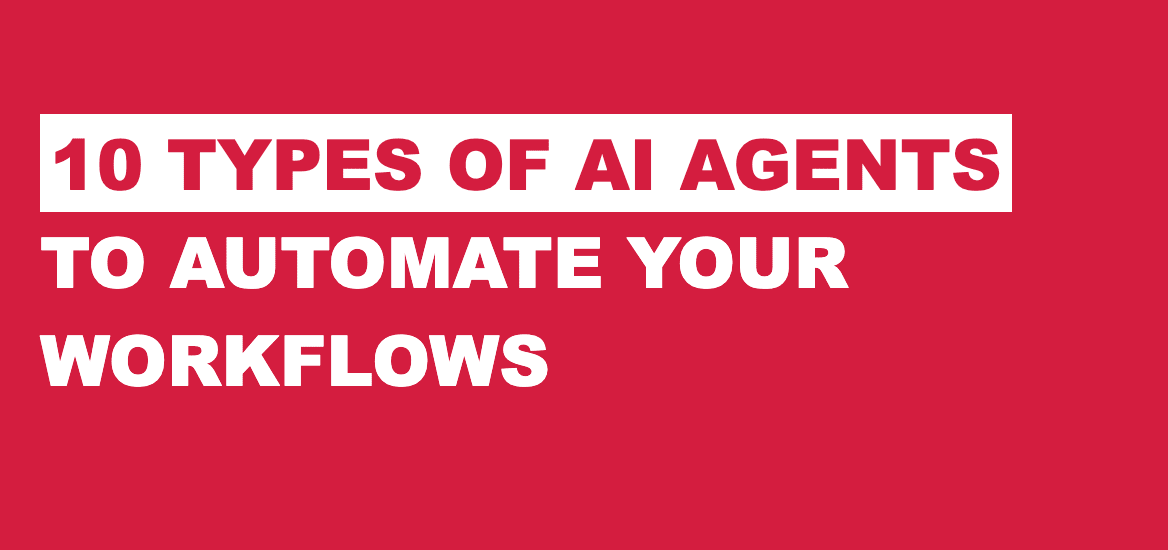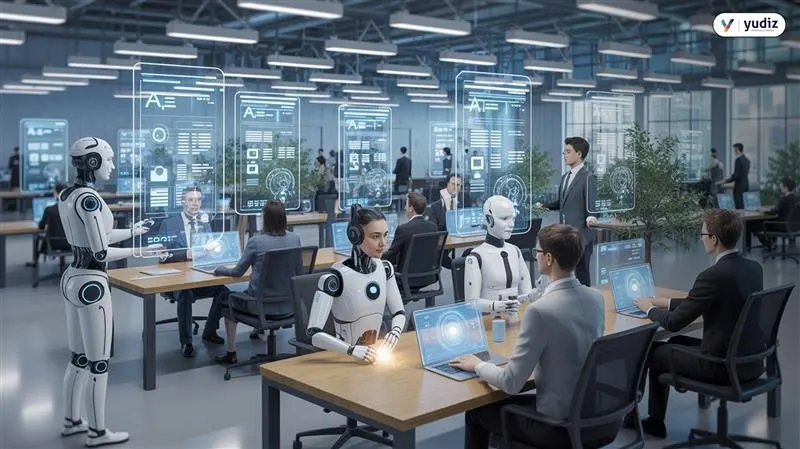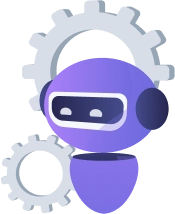10 Types of AI Agents to Automate Your Workflows

For many of the businesses, AI automation has now become a necessity. Many of them have started adapting the best AI agents for productivity into the business. However, this in turn has also enhanced the business operations and reduced human errors. And this is all because of the types of AI agents available in the market used for the automation process.
AI workflow automation is gaining more popularity and is growing among different industries. Nearly 70% of the organizations have adopted automated workflows with AI, and approximately 30% already seen progress in productivity using AI workflow automation. Let us have an in-depth guide about the top 10 types of AI agents for business automation.

Top 10 AI Agents for Automation
1. Simple Reflex Agents
The simple reflex agent is a basic type of AI agent. This AI agent responds quickly based on the current input and does not require memory or a learning process. They react based on pre-defined conditions based on the input given. This type of AI agent is easy to implement and is very efficient.
Use Cases:
- Simplex AI Agents are ideal for their transparency. For example, in a smart building, the reflex agent can trigger a fire suppression when a sensor detects a threshold.
- In case, if their mechanical fault is detected, it shuts down the machinery
- It triggers security alerts when unauthorized access is detected.
- It can send predefined messages to the sender via email based on specific keywords
2. Model-Based Reflex Agents
The model-based reflex agents analyze current conditions based on experience and accordingly make a decision. They combine it with real-time perception and build a model for that environment. An intelligent security system makes use of sensors to detect any activity, area of space, and time. Hence, it can detect whether it is a normal activity or a potential security threat and can highlight when any suspicious activity takes place.
Use Cases:
- It is useful in the manufacturing industry for predictive maintenance.
- Intelligent Traffic Control System
- In smart homes, if the temperature sensor spikes, then this type of intelligent AI checks memory & trends and helps to know whether the fluctuations are temporary or harmless
3. Goal-Based Agents
Goal-based agents, as the name defines it, are designed to achieve a specific goal, not just react. They evaluate how different actions can contribute to achieving a desired outcome or goal. Comparatively, this AI workflow automation is more strategic as compared to reflex agents. One of the best examples of a goal-based agent is a personal fitness app. It defines a new object, tracks health-related activities, and accordingly creates a plan to reach the desired goal.
Use Cases:
- In warehouse automation, task planning is created
- In self-driving cars, integrating navigation routes with these agents.
- Helps in planning temperature adjustments to reach the desired temperature in a smart heating system
- Maintaining the targeted stock levels in the inventory management system
Also Read : AI Agents Explained: Types, Functions & Where They’re Used
4. Utility-Based Agents
This AI agent for automation is beyond the goal-based agent type. This is because it makes the decision that gives maximum efficiency and satisfaction. There is a difference between goal-based and utility-based AI agents. In goal-based, it helps to reach the goal, whereas in utility-based, it analyzes and delivers the result with the highest benefit as per the criteria.
Use Cases:
- Personalized recommendation as per the user’s search and behavior (Amazon, Netflix)
- Used in logistics to choose the best and cost-effective delivery route
- In e-commerce, it suggests products with dynamic pricing strategies
- In logistics, picks are made with a cost-effective delivery route as per the location
5. Learning Agents
Learning, as the name suggests, this AI agent continuously improves its performance by learning from its past performance. However, a learning agent is based on four components. It includes –
- Learning Element: With the interactions, AI agents acquire new knowledge about the environment
- Critic: Before delivering the output, it analyzes the action and how much it matches the desired response.
- Performance: The tasks are completed as per its learning
- Problem Generator: There are different scenarios created, understand the benefits & deliver the right response.
Use Cases:
- Banking helps to detect fraud and suspicious activities
- Useful in marketing campaigns for predictive analysis
- Help know the users’ preferences using AI-powered virtual assistants
- Learn to identify defects more accurately in quality control systems
Also Read : Top 10 Use Cases of AI Agents in Business
6. Multi-Agent System
The multi-agent system makes use of multiple agents that work together to solve complex problems. Each agent within this system has different roles to achieve the objective. However, there are different types of multi-agent systems. It includes –
- Cooperative System: With this system, agents share information and resources to achieve a common result. For example, multiple robots on a basic task
- Competitive System: Here, the agents compete for the desired result with defined rules. For example, in an auction system making use of multiple bidding agents
- Mixed System: A combination of cooperative and competitive environments where agents share information with limited resources
Use Cases:
- Useful for smart city management
- In warehouse, muti-agents helps in moving and sorting of items
- Helps in resource allocation, like processing time and storage space
- Distributed logistics and supply chain management
7. Conversational AI Agents
Conversational AI agents uses a combination of natural language processing(NPL) and machine learning and interacts with human in a conversational way. These agents adapt with simple bots and advanced systems like chatgpt. They act like super-intelligent chatbots. Whereas traditional chatbots are limited to responses whereas conversational AI agents can interpret with the users intent.
Use Cases:
- Best in use for customer support automation
- Useful as a healthcare chatbot for assisting patients
- Act as virtual assistant in shopping
8. Autonomous Virtual Assistants
The autonomous virtual assistant can handle the task right from start to end with no constant checkins or prompts. These assistants have the ability to carry out complex workflows by themselves and can make the decision accordingly.
Use Cases:
- Autonomous drones for delivery
- Monitoring & harvesting of crops using agricultural robots
Also Read : How to Create a Custom AI Agent That Fits Your Business Needs?
9. Generative AI Agents
Generative AI agents are a combination of large language models(LLMs) and generative adversarial networks(GANs) that create text, images, videos etc. They are used for automating creative workflows for different industries considering the ethical concerns like misuse, deepfake etc. This AI agent helps to enhance creativity, quick content creation with creative innovation.
Use Cases:
- Creating content like blogs, ads and social media posts
- Designing of products using different prototypes
- Generating data for machine learning models
10. AI Powered Knowledge Agents
AI-powered agents help to get usable data insights from massive amounts of unstructured data. They collect the information, process it and organize relevant points. This helps the team to make smarter decisions. It has the ability to transcribe and summarize the meeting. Using voice search, it searches for the answer in the database and gives the desired results
Use Cases:
- Create a structured data to take informed decisions
- Summarize & Transcrib the points discussed in the meeting
- Identifies the key insights of the meeting
- Can convert entire meeting into searchable, that gives answer from the database
Revolutionize with AI Today!

Conclusion
With the evolution of AI technology in different industries, businesses are moving towards autonomous multi-agent ecosystems. Here with this, different types of AI agents are used, where they collaborate with each other and manage the entire business process. For a business, looking to adopt these AI agents will benefit from competitive edge, efficiency and most importantly reduced operational costs. As a business, looking to integrate with different types of AI agent development, then one of the best ways is to choose the right AI agent development company that can assist you right from the start to the end.
Frequently Asked Questions
AI agents are software programs that make the decision by perceiving the environment that helps to achieve specific goals. They automate workflows by handling repetitive, data-driven, or rule-based tasks without human intervention
There are different types of AI agents. Some of them are – Simple Reflex Agents, Model-Based Reflex Agents, Goal-Based Agents, Utility-Based Agents, Learning Agents
There is an important role of intelligent agents in task automation. They independently perceive, analyze, and act within an environment to achieve desired results. Intelligent agents can adapt to changes, learn from previous tasks, and make decisions based on real-time data
Yes, AI agents can improve productivity for small businesses. They can manage scheduling, handle basic customer service inquiries, generate marketing content, and even analyze sales data to provide actionable insights
Goal-based AI agents work on selected actions that lead to a defined objective. They use an internal representation of the environment to predict outcomes before acting. Also, they do have the ability to plan, reason, and adjust actions based on changing conditions makes them ideal for strategic workflow automation.
Some of the examples of AI agents used in daily workflows includes –
- Virtual Assistants (Alexa, Siri, Google Assistant) – They manage with schedules, reminders, and smart home devices.
- Email Filters – Automatically categorizing spam and prioritizing important messages.
- Chatbots – Providing instant customer service on websites.
- Recommendation Engines (Netflix, Amazon) – Suggesting products or content based on user behavior.















